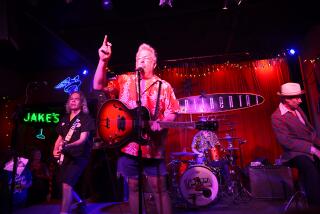STONE’S ‘NIXON’
- Share via
In describing Richard Nixon’s upbringing (“Wrestling Nixon’s Demons,” by Elaine Dutka, Sept. 24), are Dutka and/or Oliver Stone equating parochialism with Quakerism? As a birthright Quaker, I can report that the alive-and-kicking Quaker faith (not to be confused with the current wave of “Friends churches” in the Southwestern U.S.) was and remains decidedly un-parochial.
Can stereotypes be left on the oatmeal box?
ELISABETH GRAHAM
Garden Grove
“Nixon” director Oliver Stone is quoted as saying that “it’s a ‘Godfather II’-type film. The themes are grand, Shakespearean, in a sense.” How correct that is. Nixon is Michael Corleone. In watching the three “Godfather” films, what you basically have is Hamlet becoming King Lear by way of Macbeth and Richard III.
If that isn’t a metaphorical description of the 37th President of the United States, I don’t know what is. We can only hope that Stone’s film will match his ambition. STEVE BARR
Culver City
Dutka didn’t get the date right on one of the defining moments in the Nixon presidency. Nixon’s pre-dawn visit to the Lincoln Memorial to talk with students took place immediately after the killing of four students at Kent State University in May, 1970, not in 1972.
KEN McINTYRE
Torrance
I pointedly disagree with a statement attributed to Stone that Gandhi and Patton were played by people who were character actors at the time.
Perhaps Ben Kingsley, who played Gandhi, could be thought of as such, but George C. Scott, who had impressive roles in such films as “The Hustler,” “The List of Adrian Messenger,” “Dr. Strangelove” and starred in the television series “East Side/West Side,” was hardly a character actor!
EDDIE CRESS
Los Angeles
More to Read
Only good movies
Get the Indie Focus newsletter, Mark Olsen's weekly guide to the world of cinema.
You may occasionally receive promotional content from the Los Angeles Times.










